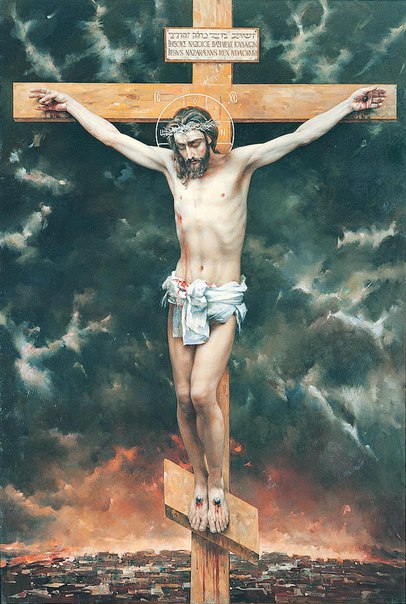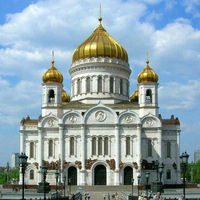Без сокрушения сердца мы не поймем ни Евангелия, ни пророков. Когда Авраам увидел Бога, он горько оплакал себя: «Я прах и пепел» (Быт. 18: 27). Так же поступил и Исаия, которого святые отцы называют «пятым евангелистом», потому что он так ясно прозрел дух всей жизни Христовой. Потому и песнопения Великого четверга в большой мере вдохновлены его словами. И Святая Литургия тоже начинается словами пророка Исаии: «Яко овча на заколение ведеся и яко агнец непорочен прямо стригущаго его безгласен, тако не отверзает уст Своих» (Ис. 53: 7).
Отец Софроний говорил, что Исаия увидел в духе этос (Этос – характер, нрав, индивидуальность, совокупность стойких черт индивидуального характера) Литургии, этос Христа. Этот пятый евангелист, когда познал славу Божию, сказал: «Горе мне, ибо погиб я, человек окаянный и нечистый» (ср.: Ис. 6: 5). Он не искал оправдаться пред Богом и людьми, как делали это впоследствии евреи, но презрел свою правду, вменив все дела своей правды в испачканную одежду пред Богом.
А святой апостол Петр, когда познал величие Божие, стал свидетелем чуда, когда Господь наполнил не только сеть его рыбами, но и сердце восхищением. Он пал тогда на колени и сказал: «Выйди от меня, Господи! потому что я человек грешный» (Лк. 5: 8).
Тот же порыв был и у всех святых, видевших славу Божию. Следовательно, если нам удастся непрестанно хранить сокрушение сердца, мы осознаем наше неразумие, нашу слепоту, нашу неправость, наши недостатки, что мы лишены всего, что благо и свято, а превыше всего любви Божественной. И уже не будем уязвляться, когда кто-нибудь ругает нас и говорит нам тяжкие слова, поскольку мы сами поставили себя ниже всех.
Архимандрит Захария (Захару)
Отец Софроний говорил, что Исаия увидел в духе этос (Этос – характер, нрав, индивидуальность, совокупность стойких черт индивидуального характера) Литургии, этос Христа. Этот пятый евангелист, когда познал славу Божию, сказал: «Горе мне, ибо погиб я, человек окаянный и нечистый» (ср.: Ис. 6: 5). Он не искал оправдаться пред Богом и людьми, как делали это впоследствии евреи, но презрел свою правду, вменив все дела своей правды в испачканную одежду пред Богом.
А святой апостол Петр, когда познал величие Божие, стал свидетелем чуда, когда Господь наполнил не только сеть его рыбами, но и сердце восхищением. Он пал тогда на колени и сказал: «Выйди от меня, Господи! потому что я человек грешный» (Лк. 5: 8).
Тот же порыв был и у всех святых, видевших славу Божию. Следовательно, если нам удастся непрестанно хранить сокрушение сердца, мы осознаем наше неразумие, нашу слепоту, нашу неправость, наши недостатки, что мы лишены всего, что благо и свято, а превыше всего любви Божественной. И уже не будем уязвляться, когда кто-нибудь ругает нас и говорит нам тяжкие слова, поскольку мы сами поставили себя ниже всех.
Архимандрит Захария (Захару)
Without heartbreak, we will not understand the gospel or the prophets. When Abraham saw God, he wept bitterly: “I am dust and ashes” (Genesis 18: 27). Isaiah did the same, whom the holy fathers call the "fifth evangelist," because he so clearly saw the spirit of the whole life of Christ. Therefore, the chants of Great Thursday are to a large extent inspired by his words. And the Holy Liturgy also begins with the words of the prophet Isaiah: “As a sheep for the slaughter, and as a lamb blameless, directly shearing his voice, this does not open His mouth” (Isa. 53: 7).
Father Sofrony said that Isaiah saw in the spirit of ethos (Ethos - character, character, personality, set of persistent traits of an individual character) Liturgy, ethos of Christ. This fifth evangelist, when he knew the glory of God, said: “Woe to me, for I perished, a reproached and unclean person” (cf. Isa. 6: 5). He did not seek to justify himself before God and people, as the Jews subsequently did, but he despised his truth, imputing all the deeds of his truth in soiled clothing before God.
And the holy apostle Peter, when he knew the greatness of God, witnessed a miracle when the Lord filled not only his net with fish, but also his heart with admiration. He then fell to his knees and said: “Come out of me, Lord! because I am a sinful man ”(Luke 5: 8).
All the saints who saw the glory of God had the same impulse. Therefore, if we succeed in continually preserving the contrition of the heart, we will recognize our unreasonableness, our blindness, our wrongness, our shortcomings, that we are deprived of all that is good and holy, and above all Divine love. And let’s not bite when someone scolds us and says hard words to us, because we ourselves have set ourselves below everyone else.
Archimandrite Zachariah (Zaharu)
Father Sofrony said that Isaiah saw in the spirit of ethos (Ethos - character, character, personality, set of persistent traits of an individual character) Liturgy, ethos of Christ. This fifth evangelist, when he knew the glory of God, said: “Woe to me, for I perished, a reproached and unclean person” (cf. Isa. 6: 5). He did not seek to justify himself before God and people, as the Jews subsequently did, but he despised his truth, imputing all the deeds of his truth in soiled clothing before God.
And the holy apostle Peter, when he knew the greatness of God, witnessed a miracle when the Lord filled not only his net with fish, but also his heart with admiration. He then fell to his knees and said: “Come out of me, Lord! because I am a sinful man ”(Luke 5: 8).
All the saints who saw the glory of God had the same impulse. Therefore, if we succeed in continually preserving the contrition of the heart, we will recognize our unreasonableness, our blindness, our wrongness, our shortcomings, that we are deprived of all that is good and holy, and above all Divine love. And let’s not bite when someone scolds us and says hard words to us, because we ourselves have set ourselves below everyone else.
Archimandrite Zachariah (Zaharu)

У записи 4 лайков,
0 репостов.
0 репостов.
Эту запись оставил(а) на своей стене Вероника Вовденко

























